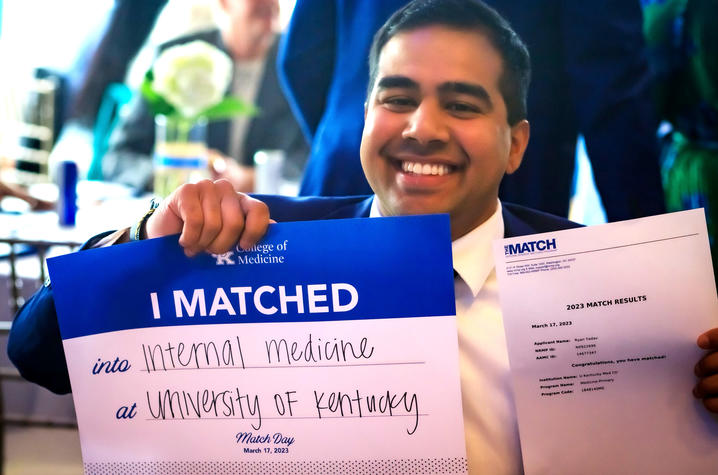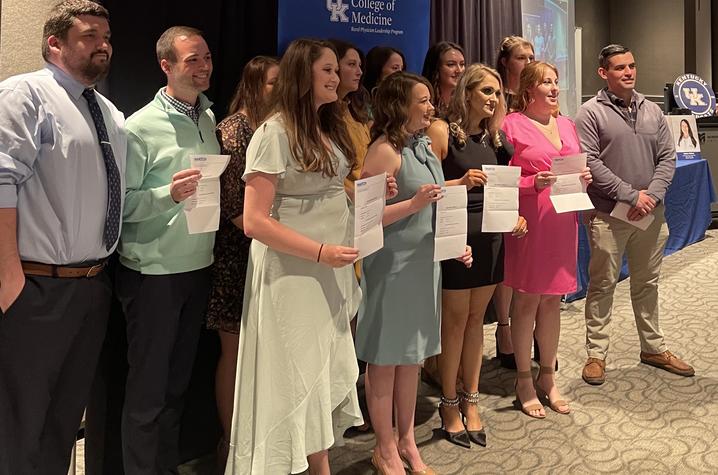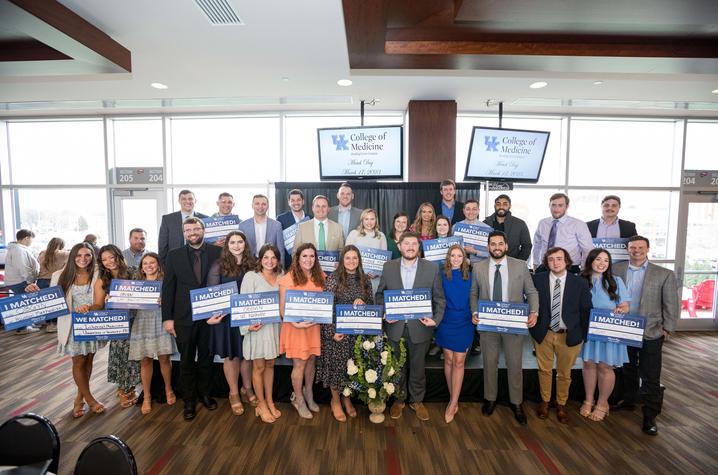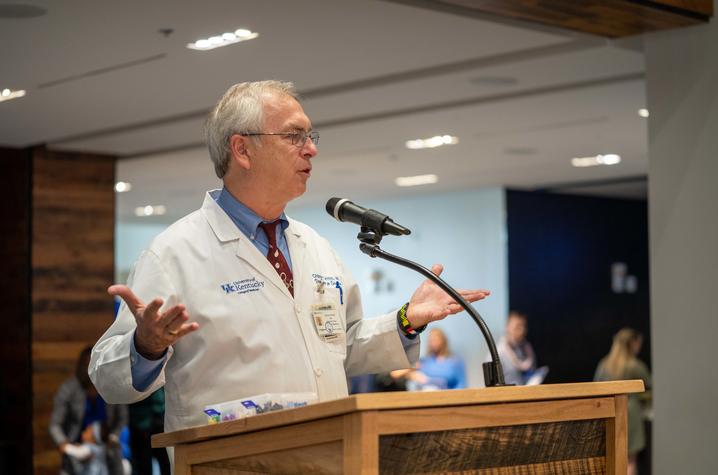Tackling physician shortage, UK College of Medicine to graduate largest-ever class
LEXINGTON, Ky. (April 25, 2023) — In 2013, the Commonwealth of Kentucky Health Care Workforce Capacity Report announced a grim statistic: by 2025, Kentucky would be facing an estimated shortage of 960 primary care physicians, the third-greatest shortfall in the U.S.
The physician shortage is not unique to Kentucky, nor is it limited to primary care – a 2021 report from the Association of American Medical Colleges (AAMC) estimated that nationwide demand for all physicians will exceed the existing supply by 37,800 up to 124,000 by the year 2034. Aside from primary care, the greatest physician shortages in the Commonwealth include surgical subspecialties, psychiatry, and pediatric primary and specialty care. Additionally, 61% of the greatest physician needs in Kentucky are in rural areas.
“The physician shortage in Kentucky is severe,” said Charles “Chipper” Griffith III, M.D., acting dean for the University of Kentucky College of Medicine. “There are counties without a single physician, and even in parts of Lexington and Louisville, there are areas that are underserved.”
In the past two decades, the UK College of Medicine has gradually increased enrollment, boosting class size from 100 per year in the early 2000s to 136 graduating physicians by the year 2013. However, with class sizes at maximum limits due to classroom constrictions and clinical capacity, UK has been forced to turn away several hundred qualified Kentucky applicants to medical school every year.
Since reaching that max limit in 2013, the UK College of Medicine and UK HealthCare have made tremendous strides to address this issue. With the goal of “training Kentuckians in Kentucky to practice in Kentucky,” UK worked with other Kentucky clinical partners and other state universities to create opportunities for more Kentucky medical students through regional medical campuses, with the ultimate goal of growing the number of physicians who will stay in Kentucky to practice medicine. All combined, these campuses will be able to graduate up to 201 new physicians each year, with a total enrollment of up to 804.
This year, across all four sites of the UK College of Medicine – Lexington, Morehead, Bowling Green, and Northern Kentucky – a record-setting class of 190 medical students are set to graduate and begin practicing medicine.
A banner Match Day for Kentucky
Match Day is a long-standing medical school tradition, a nationwide event where medical students learn where they have matched for their residencies following graduation. The national initial match rate for medical students is roughly 92%, and UK’s rate has historically been even higher than that. This year’s initial match rate at UK – with the largest-ever class of graduating medical students – is 97%. The National Resident Matching Program works with students who have not initially matched to fill appropriate open residency positions, ensuring that eligible graduates are able to continue their training after medical school.
But even more importantly, says Griffith, is the match rate of students remaining in Kentucky. Historically, 25-30% of UK medical students matched to a residency in Kentucky; 2017-2018 data matches that trend. Beginning in 2019, that number began growing, and this year, 42% of UK graduates will be staying in-state to begin practicing medicine as a resident. Since 2017, UK has more than doubled the number of new physicians remaining in-state.
With UK’s largest graduating class matching in Kentucky at the school’s highest rate, this bodes well for reducing the physician gap.
“The biggest factor for a physician practicing in Kentucky is both going to medical school and doing a residency in Kentucky,” Griffith said. “Nearly 9 of 10 physicians who do both will remain in-state to practice when residency is finished.”
With this in mind, UK has placed more emphasis on enrolling in-state students – in recent decades, roughly 70-75% of medical students were from Kentucky, and the goal now is for 85% of each medical class to be a Kentuckian or have a tie to the state.
The Rural Physician Leadership Program
Developed jointly by the UK College of Medicine, Morehead State University, and St. Claire HealthCare, the Rural Physician Leadership Program (RPLP) was UK’s first foray into a regional-style medical campus. The program was developed to train students who are interested in practicing rural medicine after graduating, and the program has capacity for up to 12 students per year.
RPLP students complete their first two years of education on UK’s main campus in Lexington and spend years three and four in Morehead, rotating through St. Claire HealthCare and other rural clinical sites in the area.
The RPLP has been highly successful since its launch in 2009. With this year’s class, the RPLP will have graduated 110 physicians well-versed in rural medicine, with top three residency choices being areas of primary care.
Additionally, two of every three RPLP alum are now practicing in the Commonwealth – and 92% of the participants who are from Kentucky now practice in rural Kentucky.
“The premise behind this program works,” said Rebecca Todd, M.D., associate dean for the RPLP and an OB/GYN at the UK HealthCare Morehead Women’s Health Clinic located at St. Claire HealthCare. “It’s hard to transplant someone who is used to – and who loves – an urban area into a rural area. But if you take students from rural communities and train them to be physicians, they want to go back and practice in those rural communities.”
Having the opportunity to live and train in a smaller community allows RPLP students to have more one-on-one time with the physicians they’re learning from, almost like an apprenticeship, Todd says. Students get the advantage of closer mentorship coupled with UK’s rigorous curriculum to prepare them for their careers in medicine.
“When you work with regional campuses, you get both the resources from the larger institution, like UK, but you also have that smaller, close-knit feel,” Todd said. “I think this program really brings out the best in all medical training.”
The UK College of Medicine-Bowling Green Campus
In the fall of 2018, UK took another huge step in growing its class size by partnering with Western Kentucky University and Med Center Health in Bowling Green, which operates six hospitals and more than 30 clinics in the region. These medical students complete their classwork and clinical experience in Bowling Green, primarily at The Medical Center at Bowling Green, the largest hospital in the Med Center Health system.
“That’s a good thing – we’re meeting the mission,” said Todd Cheever, M.D., a UK associate professor of psychiatry and the associate dean of the UK College of Medicine-Bowling Green Campus. “Having students from this region, where they can train close to their families and support systems, is very important.”
Adding this regional campus has enabled UK to train up to 30 more future doctors each year. This year, the Bowling Green Campus will graduate its second class, and seven of those graduating students will remain in Bowling Green for residency.
Across the Bowling Green Campus’s two graduating classes, nearly half matched into primary care, and 27 matched in Kentucky health systems for their residency.
Cheever, who earned his undergraduate degree from WKU and his medical degree from UK, has been with the UK College of Medicine for 36 years and was eager to become an integral part of the Bowling Green Campus when it opened.
I’ve been honored lead this new program,” he said. “Both WKU and UK have meant a great deal to me and have played a critical role in my development. It’s been exciting to work in a position that is playing such a pivotal role in addressing the physician shortage in our state.”
The UK College of Medicine-Northern Kentucky Campus
UK’s most recent regional campus, a partnership with Northern Kentucky University and St. Elizabeth Healthcare, will be celebrating its first-ever class of graduates next month.
This campus currently has capacity to train up to 35 students a year, who complete their coursework and clinical experience in Northern Kentucky. More than 90% of the student body are from Kentucky or the southwestern Ohio counties that are close to the Northern Kentucky Campus.
UK College of Medicine alum Steven Haist, M.D., led the Northern Kentucky campus for four years, launching the program and overseeing the first class of graduating students. He now serves as the campus’ associate dean for curriculum and assessment.
“When I first arrived in August of 2018, I was so impressed by the support and the commitment from both of our partners, especially St. Elizabeth Healthcare – everyone was so welcoming,” he said. “The support of our partners has been instrumental in our success.”
Of this year’s inaugural class of 30 graduates, seven students will remain in Kentucky for residency, while another eight will be working at health care facilities just across the river in Ohio. Five graduates from across all UK College of Medicine sites will go into residency at St. Elizabeth Healthcare.
In March, Northern Kentucky native Holly Danneman, M.D., officially took over as associate dean for the Northern Kentucky Campus. As a UK medical school alum and family medicine physician with St. Elizabeth Healthcare, she has been thrilled to have the opportunity to teach future physicians. Being part of a regional medical campus is not only beneficial for the students, but for the physician faculty who are educating them.
“One thing that I’ve always loved during my professional life is the ability to incorporate teaching into my patient care,” she said. “Physicians who teach deliver excellent patient care, as they have to be up-to-date regarding medical information. Teaching forces physicians to bring their A game, which benefits both their learners and their patients.”
For Haist, leading the first class of Northern Kentucky graduates is one of his proudest moments.
“I’m so proud of the Class of 2023. They took a leap of faith in the vision laid out by Dean Griffith and in my ability to operationalize that vision,” he said. “They interviewed here before we even had a facility and there were no students before them. They really were pioneers and they have set a high bar for future students for years to come.”
Looking toward future growth
Griffith offers some simple math to demonstrate the importance of graduating new doctors: If UK now graduates 65 more doctors a year compared to the recent past, history shows that roughly half – around 33 – will eventually practice in Kentucky. And if the average physician takes care of roughly 5,000 patients in their lifetime, that could be an additional 165,000 patients in Kentucky each year that now have access to a physician compared to past years.
Meanwhile, continued growth of the College of Medicine enrollment remains a focus. The addition of UK’s forthcoming Health Education Building (currently in the design phase), combined with the expansion of UK HealthCare’s clinical services, means that the college could be able to add 50-65 new students per class in Lexington. Additionally, Griffith says the regional campuses also have the capacity for some growth. By the end of the decade, UK could be graduating nearly 280 new doctors each year – more than double the number from 2021.
Growing class size also means the need for more teachers, but the response from faculty at the regional campuses, has been overwhelmingly positive. The presence of a medical school has helped Med Center Health and St. Elizabeth Healthcare recruit new physicians, and alumni from UK have been particularly energized and engaged.
“A lot of these physicians didn’t plan on being teaching physicians, but they’ve found that it’s invigorating,” Griffith said. “They really enjoy it, and they’re ready to have more students.”
Griffith, an internal-medicine and pediatrics physician who first came to UK for residency in 1988, has been heavily involved in medical education throughout his tenure. He holds more teaching honors than any faculty member in the history of the College of Medicine, including the Alpha Omega Alpha/Association of American Medical Colleges Robert J. Glaser Distinguished Teacher Award (2004), which is the most highly regarded medical school teaching award in the country. And this year, he received the National Board of Medical Examiners’ Edithe J. Levit Distinguished Service Award for his valuable contributions to the group.
A self-described “life-long learner,” one of Griffith’s primary goals is ensuring that the students under his watch leave UK prepared to go out and treat patients with expertise and compassion. As patient care at UK has grown during his time here, he keeps this goal top of mind.
“It’s been very gratifying – I was always proud of our education program, but we were pretty small,” Griffith said. “The dramatic growth of UK HealthCare has been exciting to see. I’ve been proud to be a part of that. But with the clinical growth, you don’t want to forget about the foundational mission of training physicians and scientists. I always try to keep that at the forefront.”
As the state’s flagship, land-grant institution, the University of Kentucky exists to advance the Commonwealth. We do that by preparing the next generation of leaders — placing students at the heart of everything we do — and transforming the lives of Kentuckians through education, research and creative work, service and health care. We pride ourselves on being a catalyst for breakthroughs and a force for healing, a place where ingenuity unfolds. It's all made possible by our people — visionaries, disruptors and pioneers — who make up 200 academic programs, a $476.5 million research and development enterprise and a world-class medical center, all on one campus.











